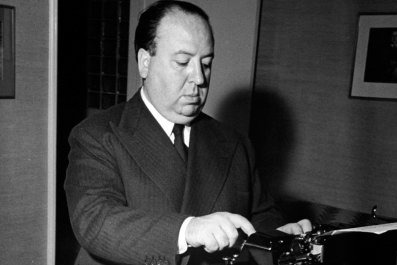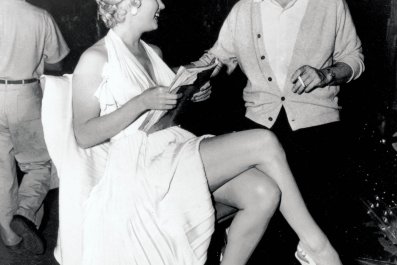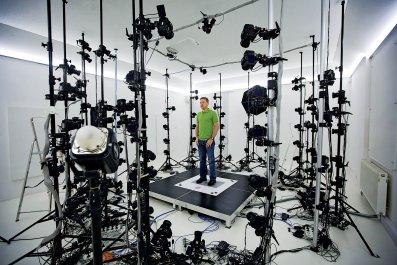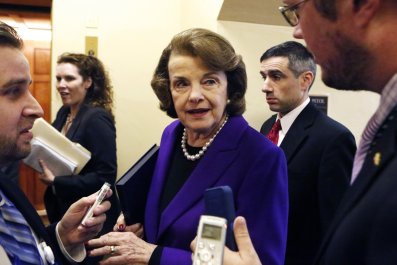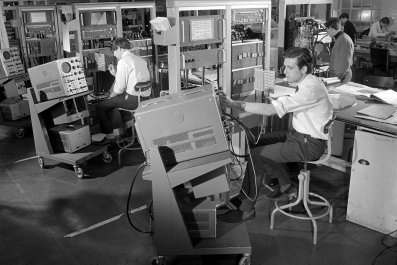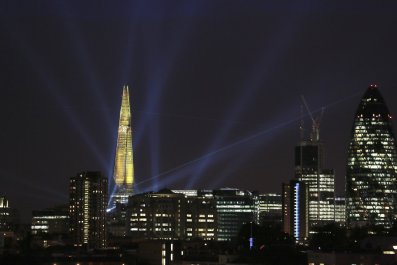If you think the Best Picture Oscar field seems lame this year, just wait. Movies are only going to suck more.
Economic and technological forces are pushing the peculiar art form of the movie toward the same fate as opera and epic poems. Art forms rarely die, but they do get out of step with the times and wind up huddled in a niche, shivering in the cold.
As that happens to movies, talent will flow into more popular and lucrative art forms. It's no coincidence that Woody Allen just signed a deal to produce a series for Amazon.com. As the best talent leaves the movies, the quality of movies will plunge.
The economic side of movies already looks like Tokyo after a Godzilla constitutional. In 2014, the number of people who went to the movies was the lowest in two decades. In 2002, movie attendance in North America hit an all-time high, as theaters sold 1.57 billion tickets. Last year, that dropped to 1.26 billion—down 300 million tickets. Revenue is down 5 percent versus 2013, the biggest decline in nine years. Revenue from other sources, like home video and international showings, isn't saving Hollywood's tuchas like it used to. Americans are watching cheap streaming movies more and buying movies less, and overseas audiences love our cartoonish flicks like The Avengers and Frozen but don't give a crap about stuff like Selma or Boyhood.
At the same time, movies keep getting more expensive to make. Universal Pictures brags that it focuses on "modestly budgeted" films like Unbroken, yet even those cost about $70 million. Now that social media spreads opinions about new movies instantly, a movie has to win a big audience the first weekend or that investment is sunk. There is no middle class in moviemaking—only the few blockbusters, then everything else. The top 1 percent take all. Where's the Occupy Hollywood movement?
These economic troubles are not a blip. They are a trend driven by technology, and the technology is not going away unless some massive cyberattack fries every last digital device.
First of all, theaters have always been the financial locomotive of movies, and technology keeps making them less and less relevant. At this month's Consumer Electronics Show, dozens of companies showed off huge, curved, 4K TVs that display movies as well as any theater screen. Combine that with HD streaming, microwave popcorn and a bottle of Chianti, and there's only one reason left to go to a theater: to see a movie the day it comes out.
But even that advantage is going to fade away. Sony simultaneously released the apparently awful The Interview online and in theaters and made $15 million in four days. Other studios are calculating how long before that release strategy is the norm. "Everybody has to take a look at it because the world has changed," Nikki Rocco, who just retired after nearly 50 years as Universal's head of domestic distribution, told The Associated Press.
The plight goes much deeper than just theaters. Late last year at a conference in New York, Amazon's Jeff Bezos got talking about why books can be a tough sell in today's market. As he sees it, books don't compete against other books. Instead, books compete against every other way you can spend your time. For a lot of the population, the time investment in a book is too much to ask. Even if books were free (and, they are, at the library), the reading of books would not significantly increase.
The movie as we know it is generally a 90- to 180-minute, one-off production—a single, long work meant to be watched beginning to end. How does that format make sense today? A huge and growing amount of entertainment is being consumed on the 7 billion mobile devices swarming the planet. People peering into phones and tablets want stuff in smaller doses. Movies are too long for that medium. Money and young talent are flowing to short-burst programs like Smosh and RealAnnoyingOrange. The duo behind Smosh. which you've probably never heard of, is worth nearly $6 million.
Yet every civilization needs long-form storytelling, rich in character and complex plot lines. Over the past decade, audiences and talent have been drawn to series like The Sopranos, Breaking Bad and Game of Thrones. As long-form visual storytelling, that format is better than movies for our time and technology. A single show, meant for home or portable screens, is an hour or less, which makes it more competitive against other lures for your time. One show in a series pulls you into another—a hook missing from movies. With streaming services such as Netflix and Amazon, you can watch these stories anytime, anywhere—one at a time or all night on a binge.
The center of gravity in entertainment is shifting. Matthew McConaughey did True Detective, Tea Leoni is in Madame Secretary, Netflix signed up Adam Sandler, and Amazon nabbed Woody to create an unspecified series. (I'm rooting for an update of 1973's Sleeper: After 42 years in the future, Miles Monroe returns to New York in 2015 as an old guy and invents the orgasmatron.) The best talent will increasingly want these kinds of long-form gigs. The prestige is there. The money is there. The artistic freedom is there. And most of all, the audience is there.
If McConaughey or Allen—or Christopher Nolan, Robert Downey Jr., Meryl Streep—tie up with a series that goes on for a few years, they'll have less time to make movies. If the most talented directors, writers and actors make fewer movies, then more movies will be made by the second string. More movies will suck, and so will the movie business.
To borrow a phrase, we've seen this movie before. It goes like this: New technology changes the way media is consumed. Declining revenue leads to cost-cutting, which drives away talent. That leads to a lower-quality product, which sends audiences elsewhere, which inevitably results in more declining revenues—and the negative spiral keeps feeding on itself.
I actually had a bit part in that movie a decade ago. It was called Newspapers.




